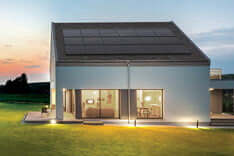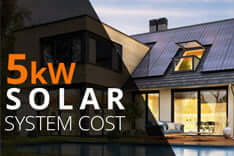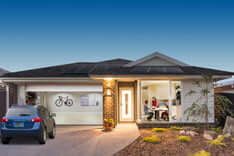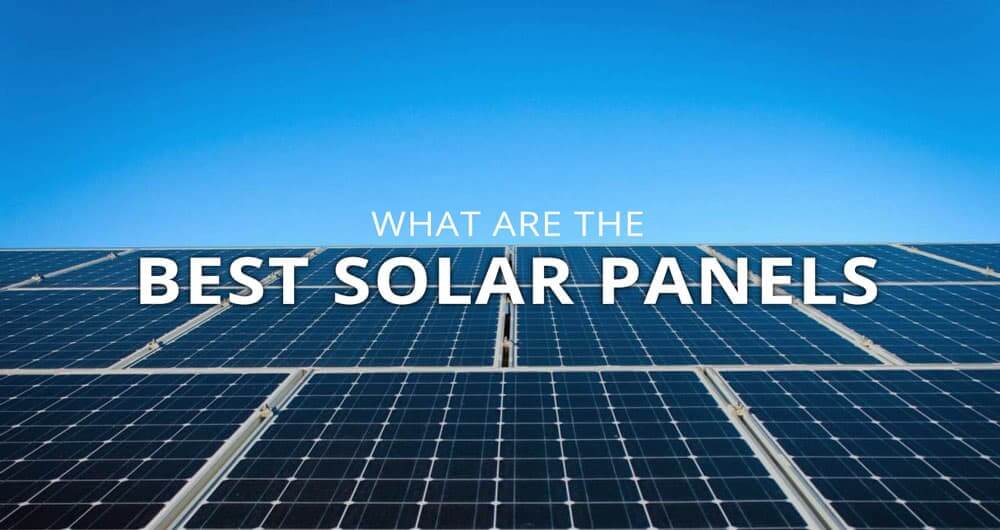Home Cost Solar Hot Water System Cost
How Much Does a Solar Hot Water System Cost in 2025?

Typically, you’re looking at spending about $3,500 on a solar hot water system, with the cost ranging between $2,600 and $6,000.<\/strong> This approximation accounts for solar rebates and installation expenses, however, remember that the ultimate cost might differ greatly depending on the model and size of the system you select, and your location.
In this article, we will provide you with a cost breakdown of solar hot water systems and explore the factors that influence the cost of these systems in 2023. This will help you make an informed decision about investing in this eco-conscious and energy-efficient heating solution.
Table of Contents
ToggleShort summary
- Solar hot water systems in Australia range from $2,600 to $6,000 with annual running costs of approximately $150.
- The cost breakdown of a solar hot water system includes upfront costs, installation costs and ongoing running costs which make it an attractive option for homeowners.
- Installing a solar hot water system provides financial and environmental benefits such as savings on energy bills and reduced reliance on fossil fuels.
Solar hot water system costs for 2025
In 2025, the initial cost of a solar hot water system in Australia ranges from $2,600 to $6,000, depending on the type and size of the system. The running costs of solar hot water systems are approximately $150 annually.
While this might seem like a hefty investment, it’s crucial to consider that solar hot water systems are significantly cheaper to run than their electric and gas counterparts.
| Average cost | $3,500 |
|---|---|
| Average range | $2,600 - $6,000 |
| Annual running costs | $150 |
Comparing solar hot water system costs with electric, gas and heat pump systems
When comparing the costs of solar hot water systems with electric and gas systems, it becomes clear just how cost-effective solar hot water systems can be.
The table below shows the average costs of the different types of hot water systems. Check it out:
| Hot water system type | Average cost | Annual running costs |
|---|---|---|
| Solar hot water system (electric or gas boosted split system) | $2,600 - $6,000 | $150 |
| Electric hot water system | $300 - $1,500 | $850 - $950 |
| Gas hot water systems | $900 - $2,000 | $600 - $900 |
| Heat pump hot water systems | $2,500 - $4,000 | $280 |
Summary of the above table:
- The price range for electric or gas boosted split solar hot water systems is estimated to be between $2,600 and $6,000+.
- While the upfront cost of these systems may be higher, the potential savings on energy bills make them an attractive option for homeowners looking to invest in a more sustainable and cost-effective solution for their hot water needs.
- The average cost for gas and electric hot water systems ranges from $300 to $2,000, which may seem more affordable initially.
- The running costs of solar hot water systems are significantly cheaper, amounting to approximately $150 annually, as opposed to $850 – $950 per year for electric hot water systems and $600 – $800 per year for gas hot water heaters.
- Heat pump hot water systems are more expensive than gas and electric systems, with costs ranging from $2,500 to $4,000 and annual running costs of $280.
Solar hot water systems have the most economical running costs. It is the most cost effective way to heat up water. With the potential for significant savings on energy bills and the added benefit of reducing your carbon footprint, it’s no wonder that more and more Australians are choosing to invest in solar hot water systems.
Cost breakdown of solar hot water systems
When considering the cost of a solar hot water system, it’s essential to understand the various expenses involved. These include upfront costs, installation costs, and ongoing running costs. The initial expenses for a solar hot water system range from $2,600 to $6,000.
Size/capacity of the system
The size of your solar hot water heater comes down to your household’s hot water consumption and how many people are in your household. For example, a 250-litre hot water tank in Australia can cost between $750 and $1300.
Here is a table showing how much solar hot water systems cost by size.
| System size/capacity | Household size | Average cost |
|---|---|---|
| 50-gallon (paired with 40 sq.ft. collector) | About 2 people | $2,000 |
| 80-gallon (paired with 60 sq.ft. collector) | About 3 or 4 people | $3,500 |
| 120-gallon (paired with 80 sq.ft. collector) | Large family of 5 or 6 people | $5,000+ |
Materials and type
There are several types of solar water heaters, such as passive and active, each with different built materials, parts, and costs. The type of solar water heater you choose will depend on your local climate.
Each type of solar water heater comprises three sections:
- Solar collectors to collect energy from the sun (solar panels)
- Collection tank
- Plumbing system that connects the system to your home
Passive systems are ideal for warmer climates, while active collectors are best suited for colder climates and have slightly different design features to keep hot water flowing.
Due to the additional design features, active solar hot water systems tend to be more expensive than passive ones.
| Solar hot water type | Average cost |
|---|---|
| Active system | $2,500 - $6,500 |
| Passive system | $1,800 - $4,800 |
We will discuss more about the types of solar hot water systems later in this article.
Labor

Labour costs account for more than half of the overall cost of installing a solar hot water system. Most solar heater specialists charge about $70 to $200 per hour, depending on where you live and the complexity of the installation.
That said, labour costs can add up to at least $900 to $1,800 of your total solar water heater installation cost. And if plumbing is needed, you will need to add an additional $45 to $180 per hour for a plumber.
The installation can take several days to complete, and the overall labour cost will depend on the size of your system and home, the local climate, where the solar collectors will be mounted (roof or ground), and additional services.
Installation costs can also vary depending on the complexity of the system and the location of the property. In some cases, additional expenses may be incurred for specific installation requirements, such as extra insulation or antifreeze in colder climates.
Parts
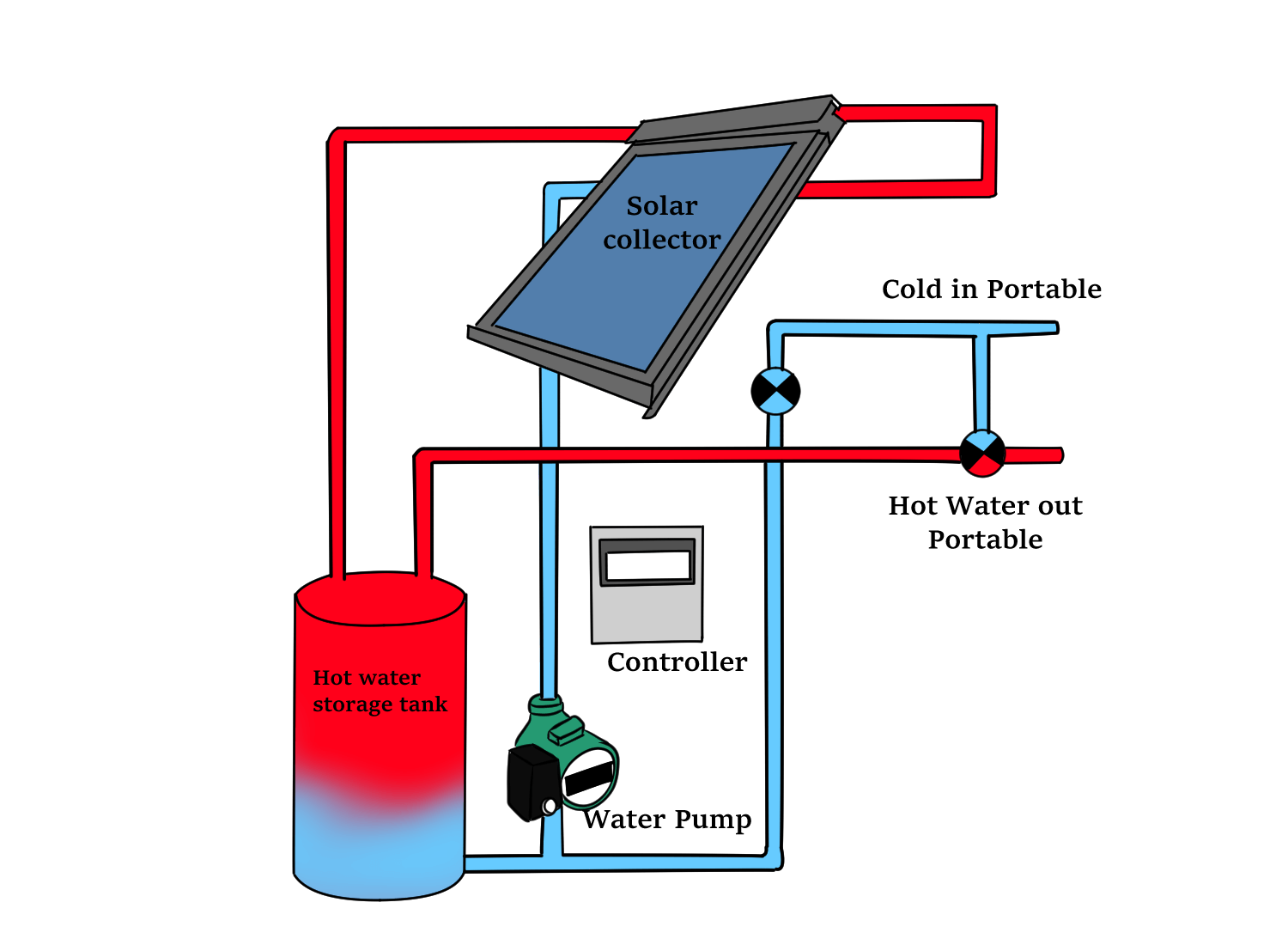
The basic parts of a solar water heater cost about $1,000 to $4,000, with an extra $1,000 to $2,500 for backup heaters, additional plumbing, and switches for active systems. The number of solar panels used also adds to the cost, each costing between $800 and $1,500.
Let’s break this down further into solar collectors, collection tanks, and additional parts.
Solar collectors
There are three types of solar collectors, each with different price tags depending on their features.
| Type of solar collector | Average cost |
|---|---|
| Flat plate collectors | $800 - 2,000 |
| Evacuated tube collectors | $1,500 - $5,000 |
| Integral collectors | $500 - $4,500 |
Collection tank
Earlier, we mentioned the combined cost of a collection tank and solar collector. The cost of a collection tank alone will vary depending on the size as described in the table below.
| Size of collection tank | Average cost range |
|---|---|
| 30 - 60 gallons | $1,200 - $2,500 |
| 60 - 80 gallons | $1,550 - $3,000 |
| 80 - 100 gallons | $1,850 - $3,900 |
| 100+ gallons | $2,600 - $5,000+ |
Additional parts
Typically, the type of solar hot water heater you choose will determine which additional parts will be required. Below are the common parts you may need for your system.
| Additional part | Average cost range |
|---|---|
| Controller | $120 - $500 |
| Water pump | $120 - $600 |
| Pump station | $550 - $950 |
| Mounting hardware | $80 - $350 |
Types of solar hot water systems and their costs
There are several types of solar hot water systems available in Australia, each with its own unique features and cost range. Broadly, these systems can be classified into two categories: active and passive systems.
In this section, we will explore the different types of solar hot water systems, their components, and their respective costs. This information will help you make an informed decision on the best solar hot water system for your home, taking into account factors such as your household’s hot water needs, available roof space, and budget.
Active solar hot water systems
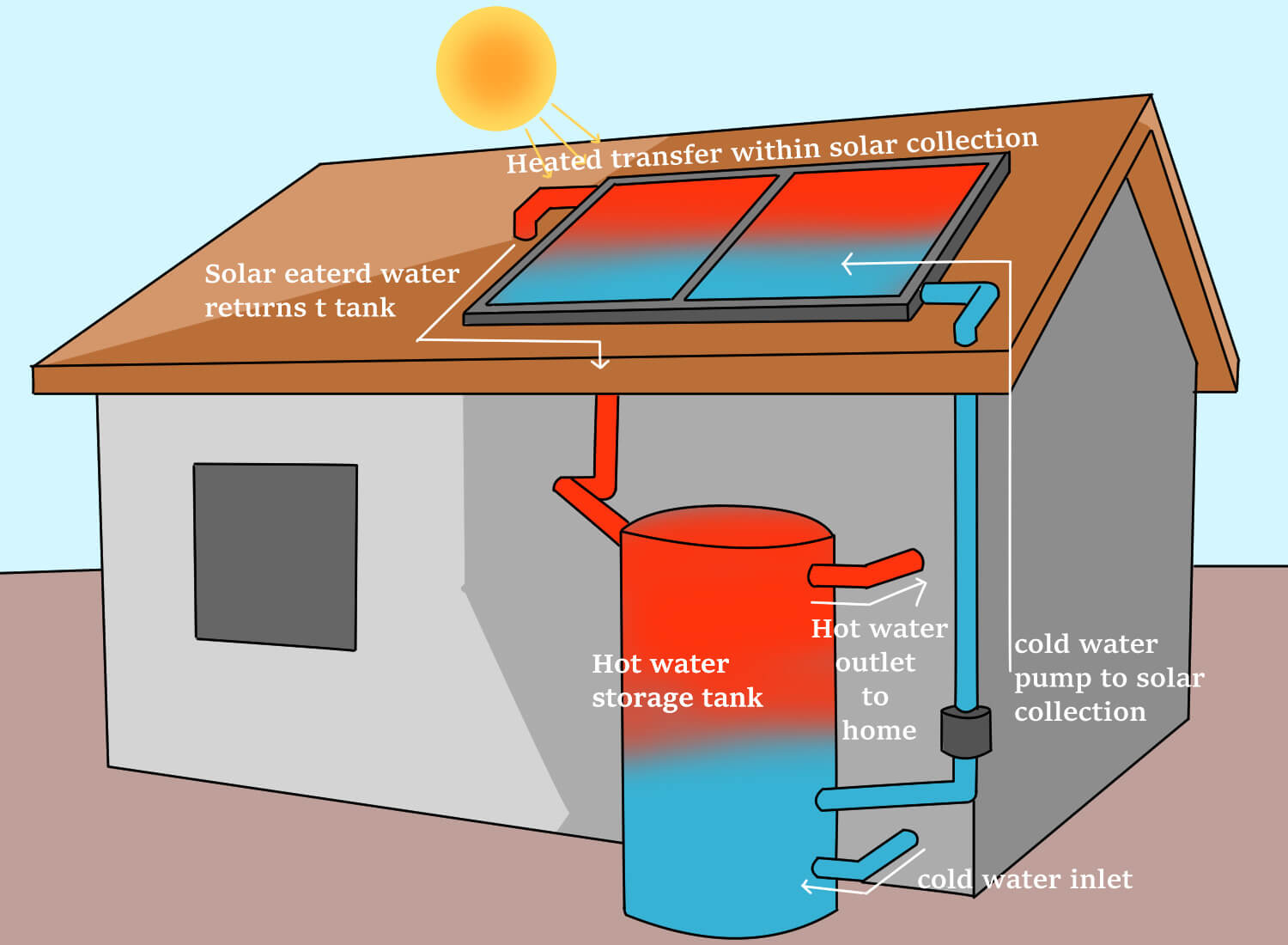
Active solar hot water systems are typically more efficient than passive systems and are a popular choice for many homeowners. These systems generally comprise a solar collector, a storage tank, and a backup system.
The solar collector captures the sun’s energy and transfers it to the storage tank, which stores the heated water until it is required. The backup system supplies hot water when the sun is not available, ensuring that your household always has access to hot water.
The cost range for active solar hot water systems is estimated to be between $2,500 – $6,500. While the upfront cost may be higher compared to passive systems, active solar hot water systems generally require less maintenance and can offer increased efficiency, making them a worthwhile investment for many homeowners.
Passive solar hot water systems
Passive solar hot water systems rely on heated pipes to preserve the water heated as it moves through the residence. They are typically more affordable than active systems, but they may require more maintenance and are generally less efficient.
A passive solar hot water system comprises a solar collector, a storage tank, and a heat exchanger, which transfers the heat from the storage tank to the water that is used in the home.
The cost of passive solar hot water systems ranges from $1,800 to $4,800, with an average of $3,300.
Although they may not offer the same level of efficiency as active systems, passive solar hot water systems still provide a more sustainable and cost-effective solution for water heating compared to conventional electric and gas systems.
Heat pump systems
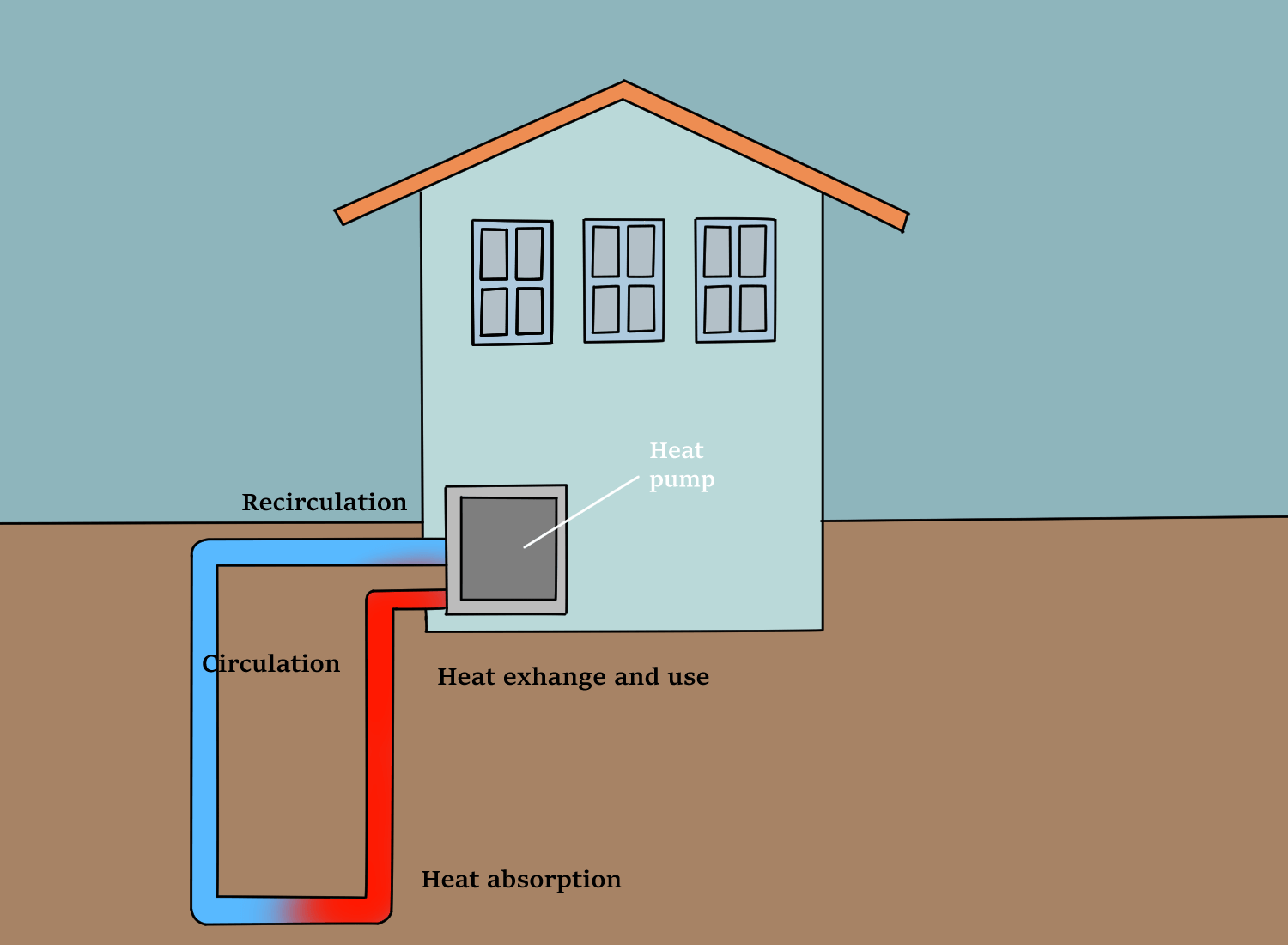
Heat pump systems are another alternative for homeowners in search of an environmentally friendly and cost-effective hot water solution.
These systems extract heat from the surrounding air and use it to heat water, making them particularly suitable for warm climates. A heat pump system generally consists of a compressor, evaporator, condenser, and expansion valve.
The cost of heat pump systems for hot water can range from $2,500 to $4,000, depending on the size, type, and brand of the system. Installation costs may also vary accordingly.
While heat pump systems may be more expensive than other types of solar hot water systems, they can still offer significant savings on energy bills and contribute to a more sustainable future.
Factors affecting solar hot water system prices
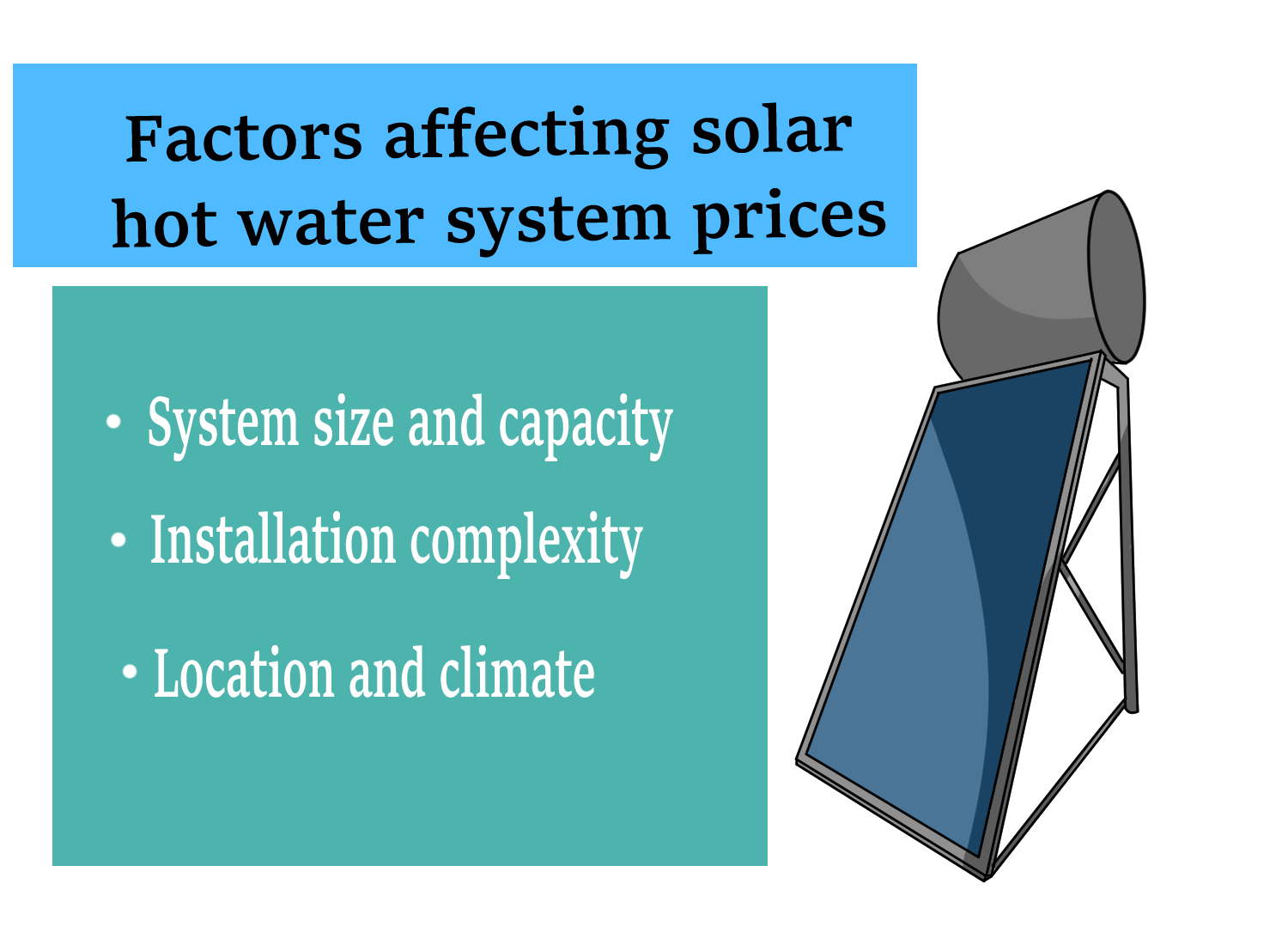
The price of a solar hot water system can be influenced by various factors, such as the size and capacity of the system, the complexity of installation, and the geographical location and climate of the property. Understanding these factors can help you make an informed decision when choosing the best solar hot water system for your needs and budget.
System size and capacity
The size and capacity of a solar hot water system can greatly affect its price. Larger systems may be more expensive initially due to increased installation and material costs, but they may have lower running costs in the long run, making them a more cost-effective option for some households.
It’s essential to choose a system that suits your household’s hot water needs, taking into account factors such as the number of occupants and the daily hot water usage.
Installation complexity
The complexity of installing a solar hot water system can also have an impact on its cost. This can be due to increased labour costs or additional expenses incurred for specific installation requirements, such as extra insulation or antifreeze in colder climates.
To minimise installation complexity and associated costs, it’s vital to research various solar hot water systems, hire a competent installer, and compare different brands of solar hot water systems.
Location and climate
The location and climate of your property can also influence the efficiency and cost of your solar hot water system. For example, colder climates may require additional insulation and antifreeze to prevent freezing, which can increase the cost of installation.
Moreover, areas with less sunlight may require larger or more efficient solar collectors to generate the same amount of energy, which can also raise the cost of the system. It’s crucial to consider these factors when selecting a solar hot water system that suits your specific location and climate.
Benefits of installing a solar hot water system
Installing a solar hot water system in your home comes with a host of advantages, both financial and environmental. Here are some of the benefits of installing the system:
Financial savings
One of the most compelling reasons to invest in a solar hot water system is the potential for significant financial savings. On average, an Australian household can save around $400 per year on water heating costs by switching to a solar hot water system.
Additionally, the payback period for a solar hot water system can be as short as five years or less when replacing an electric hot water system with a solar or heat pump hot water system.
These savings can be even more substantial when considering the long-term reduction in hot water costs. Switching from a gas or electric storage tank system to a solar hot water system or heat pump can help homeowners save up to 50% of their costs. In some cases, the savings can exceed even that amount.
With such significant savings on energy bills, it’s easy to see why investing in a solar hot water system is a smart financial decision for many homeowners.
Environmental impact
Besides the financial savings, solar hot water systems also offer substantial environmental benefits. By utilising the sun’s energy to heat water, these systems reduce energy consumption and greenhouse gas emissions. This, in turn, helps to decrease your household’s carbon footprint and contributes to a more sustainable future.
Furthermore, solar hot water systems reduce water pollution by eliminating the need for chemicals used in traditional water heating systems. They also reduce air pollution by obviating the need for burning fossil fuels.
Rebates and incentives
To further encourage the adoption of solar hot water systems, the Australian government offers various rebates and incentives for homeowners who choose to install these systems.
The primary financial incentive is provided by the federal government-regulated small-scale technology certificates (STCs), commonly referred to as the “solar rebate“. This rebate can help offset the upfront cost of a solar hot water system, making it even more affordable for homeowners.
In addition to the federal rebate, some state governments also provide incentives for solar or heat pump hot water systems, such as VIC’s Solar Homes Program, and SA’s Retailer Energy Efficiency Scheme (REES).
By taking advantage of these rebates and incentives, homeowners can further reduce the cost of installing a solar hot water system and enjoy the numerous financial and environmental benefits that come with it.
Tips for choosing the right solar hot water system
With various types of solar hot water systems available and numerous factors influencing their cost, choosing the right system for your home can be a daunting task.
To help you make an informed decision, we have compiled some useful tips for selecting the best solar hot water system for your individual needs and budget.
Assessing your household's hot water needs
To determine the appropriate size and capacity of a solar hot water system based on your household’s requirements, it’s essential to take into account factors such as the number of occupants, the number of bathrooms, and the daily hot water usage.
By accurately assessing your household’s hot water needs, you can choose a system that provides sufficient hot water without incurring unnecessary costs for a larger system than required.
Comparing solar hot water system brands
Comparing different solar hot water system brands and models can help you find the most suitable and cost-effective system for your home. Factors to consider when comparing brands include:
- Price
- Efficiency
- Durability
- Warranty
- Customer reviews
- Climate
- Roof type
- Household size
- Daily hot water usage
- Installation and maintenance costs
- Available rebates and tax credits
By thoroughly researching and comparing different brands, you can make a well-informed decision that best meets your needs and budget.
Hiring a qualified installer
Ensuring proper installation and optimal performance of your solar hot water system is crucial, which is why hiring a qualified and experienced installer is of utmost importance.
When selecting an installer, make sure they possess an appropriate licence for plumbing and an endorsement for installing solar hot water systems, and that they are either a Clean Energy Council (CEC) accredited installer or supervised by one.
FAQ's
Based on the information available, it is clear that solar hot water systems are definitely worth the money. Although there may be a higher initial investment required, these systems will eventually save you hundreds in energy costs and should more than pay for themselves over time.
As a result, solar hot water systems are an effective and economical way to heat water in your home.
A 300 litre solar hot water system will set you back around $3,190 for a single panel or $3,490 for a twin panel.
Depending on the brand and installation costs, a 250 litre solar hot water system may cost between $750 and $1,300. Despite being a bigger upfront investment than traditional electric or gas systems, you can save more in the long run.
Replacing a hot water system in Australia is an expensive endeavour, with the cost typically ranging between $800 to $3000, including installation and any necessary modifications. On average, one can expect to pay around $1500 for such a project.
Table of Contents
Toggle
